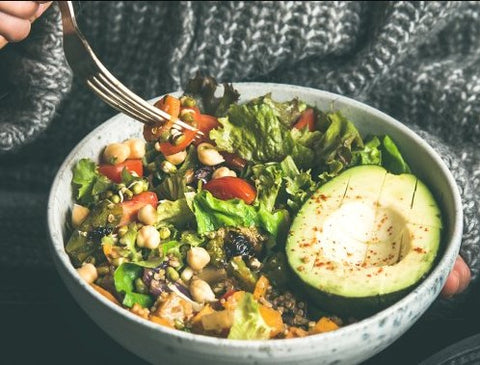If you’ve ever wondered how sleep and digestion work together or why you’ve been told not to go to bed on a full stomach, we’ve got some answers for you.
How do sleep and digestion go hand in hand?
“When you’re sleeping your entire body (including your brain) is resting but also processing the events of your day. Recording the important things, creating new memories, cleaning up any excess debris and replenishing your brain and body. Think about sleep as a natural detoxification process that your body does every night on its own,” explains Dr. Uma Naidoo, MD, a Harvard-trained nutritional psychiatrist, professional chef, nutrition specialist, and author of This is Your Brain on Food.
And all that work your body is doing while you sleep includes digestion.
“When you’re sleeping, your body is still digesting the food you ate; unconsciously, your digestive system is still working but at a much slower pace,” she says.
And getting a good night’s sleep is critical for a number of the body’s processes, and for overall long-term health.
Naidoo explains: “Research shows that sleep not only improves your immune system, productivity levels, cardiac condition, mental and emotional health, but it also has a vast impact on obesity. Poor sleep is strongly linked to weight gain; in one extensive review study, children and adults with short sleep duration were 89 per cent and 55 per cent more likely to develop obesity, respectively.”
Why have I been told sleeping on a full tummy is bad?
The quality of your sleep is affected by many factors and going to bed right after a meal may be one of them.
“Research shows that eating right before going to bed might cause sleep issues and even heartburn,” Naidoo says. “During sleep, the gastrointestinal system slows down, most of the time, salivation is decreased and the primary esophageal contraction is not frequent, a fact causing a prolongation of acid clearance during sleep. In English? It’s harder and takes much longer and much more effort for your body to digest while sleeping.”
Of course, she adds, as with everything related to nutrition, the quality of food you’re eating can make a difference. Some foods, like low-fibre, highly processed or sugary items, may rile you up and keep you from reaching good-quality sleep.
Naidoo also advises avoiding caffeine after 2 p.m. and stopping alcohol consumption a few hours before bedtime.
See more about how caffeine impacts your sleep here.
“Drinking alcohol does not ‘help you go to sleep,’ it disrupts your sleep architecture,” she adds.
Learn about why alcohol lessens sleep quality here.
Is there an ideal time frame for sleeping and eating?
In addition to those rules about caffeine and alcohol, it’s a good idea to eat your last meal of the day about three hours before bedtime, Naidoo says, to allow enough time for digestion and reduce the likelihood of conditions like heartburn.
“For optimal physical and mental health, we should be respecting our body’s own circadian rhythm as much as possible,” she says.
Laying down for bedtime too soon after eating can lead to a reflux of food from the stomach back into the esophagus, she explains.
But what if you eat early and feel hungry before bed?
“If you’ve eaten dinner earlier and are feeling hungry before bedtime, a tip is to drink a glass of plain water and wait five to 10 minutes,” Naidoo says. Hunger is partly controlled by the hypothalamus in the brain, she explains, and our hunger and thirst signals can get confused, so a glass of water may do the trick.
Bonus tips: Nutrients to promote quality sleep
While there are lots of things you can do to get a good night’s rest – from reducing screen time to exercising to keeping your bedroom cool – it’s also important to get the right nutrients. Here are Naidoo’s top three nutrients to improve insomnia and promote healthy sleep:
- Melatonin: “Melatonin is essential for good sleep,” Naidoo says. “This hormone is produced by the pineal gland in response to darkness and is located in the middle of the brain, and functions with the rhythms of the sun. You can find it in tart cherries, asparagus, mushrooms, eggs, fish, and walnuts.”
- Magnesium: “Magnesium has been shown to support restorative, deep sleep, specifically by maintaining healthy levels of GABA – a neurotransmitter that promotes relaxation and a good night’s rest. Some sources are chickpeas, leafy greens, nuts, rolled oats and bananas.”
- Tryptophan: This is an amino acid that is a precursor to serotonin, which is a hormone that makes you feel relaxed, Naidoo explains. “You can find it in turkey, chicken, edamame and chickpeas.”




